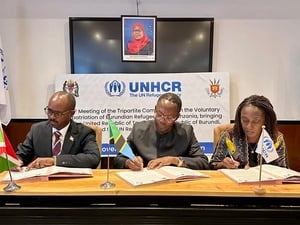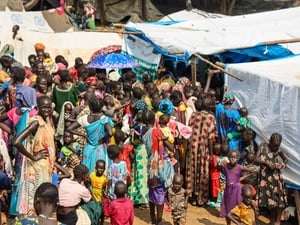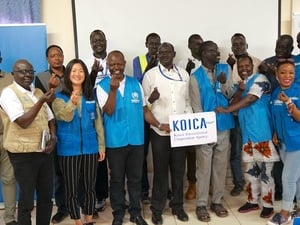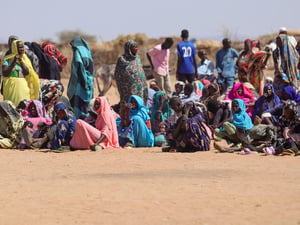UNHCR urges sustained focus on solutions for South Sudan
UNHCR urges sustained focus on solutions for South Sudan

UNHCR's Special Envoy for the Horn of Africa Ambassador Mohamed Affey together with South Sudan's Minister of Humanitarian Affairs and Disaster Management, Hon. Albino Akol Atak, World Bank Country Manager Firas Raad and Head of the Political, Press and Information Section of the European Union Delegation to South Sudan, speaking to returnees at the UNHCR protection desk in Malakal where persons with specific needs are screened upon arrival from Sudan.
UNHCR, the UN Refugee Agency, is appealing for sustained focus on long term solutions for millions of people forced to flee in and from South Sudan. Speaking in Juba, South Sudan, after a week’s visit to the country, UNHCR’s Special Envoy for the Horn of Africa Ambassador Mohammed Affey emphasized that beyond humanitarian action, supporting the creation of conditions for returns and recovery is critical to building durable peace and stability and achieving sustainable solutions for displaced populations.
"It is important to keep the momentum of the Sudan and South Sudan Solutions Initiative for refugees, returnees, Internally Displaced Persons (IDPs) and host communities and leverage the framework of the IGAD Support Platform on the Solutions Initiative to galvanize international support for a regional approach to deliver solutions for existing and newly displaced populations," said UNHCR's Special Envoy for the Horn of Africa Ambassador Mohammed Affey.
During his visit, Ambassador Affey visited Malakal, an area of the country that is a microcosm of the overlapping crises the country is facing, including inter-communal violence, flooding, widespread internal displacement, and an influx on new arrivals fleeing the violence in Sudan. A complex context that represents both a great challenge and opportunity for humanitarian, peace, and development ‘triple nexus’ programming. This includes ensuring that the newly arrived have land to settle on and cultivate, while providing access to basic services like health and education. For returning South Sudanese, it also includes the opportunity to participate in political dialogues and peace processes.
South Sudan’s refugee crisis remains the largest in Africa, with over 2.2 million South Sudanese displaced across the country’s borders. Another 2.3 million are displaced within South Sudan while the country itself hosts over 300,000 refugees from neighboring countries. South Sudan was already suffering from a deep humanitarian crisis prior to the outbreak of conflict in Sudan, with three quarters of the population deemed to be in need of humanitarian aid. The country’s crisis is being fueled by conflict, security concerns, historic flooding, food insecurity, and failing infrastructure.
Over 180,000 people have fled to South Sudan since the start of the conflict in Sudan in April. As fighting continues, more people are expected to arrive. The wider impacts of the conflict on South Sudan are manifold. The life-saving emergency assistance currently being provided by humanitarian partners and the government now needs to go hand in hand with a more comprehensive response to create conditions to allow displaced populations to rebuild their lives.
"South Sudan is at a crucial juncture. UNHCR and its humanitarian partners are fully committed to supporting the government in the reception of refugees and returning South Sudanese. They are also actively engaging with development actors and the private sector to foster the seamless integration and inclusion of refugees, returnees, and IDPs," said Affey.
For more information, please contact:
In Juba, Charlotte Hallqvist, [email protected], +211 925 580 098
In Nairobi (regional), Faith Kasina, [email protected], +254 113 427 094









